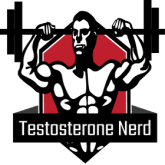Here’s where testosterone is produced in the human body:
Testosterone is a steroid hormone produced by the testicles (in men), in small amounts by the ovaries (in women), and the adrenal glands (in both sexes).
This hormone plays a major role in sexual function, muscle development, bone density, growth of body hair and fat metabolism.
It is produced by men exclusively, and women only produce it at low levels. Also, testosterone has a very short half-life and disappears after about 2-3 hours.
It is essential to sexual arousal, reproduction, and bone and muscle development. Testosterone levels rise after puberty, peak during sexual maturation and then decline gradually as you grow older.
If you’ve ever wondered where testosterone is produced in your body, you’ve come to the right place as this article is the definitive guide to answering that question.
Where and How is Testosterone Made?
Depending on your gender, testosterone can be made in one or more of the following organs:
- The Leydig cells found in the gonads (testicles) – In men
- The Ovaries – In women
- The adrenal glands – In both sexes
However, the exact process of how testosterone is made is rather complex.
But to give you a simplified idea, here’s how T is made in the body, using men as an example as they produce 8 times more of this hormone than women (1):
- The entire process starts in your brain. There, the gonadotropin-releasing hormone is produced by the hypothalamus when it discovers that we need more testosterone. After this, the gonadotropin-releasing hormone goes into the back of the brain.
- Once the gonadotropin-releasing hormone is detected, it starts to produce hormones 2 specific hormones – FSH (follicle-stimulating hormone) and LH (luteinizing hormone). Then, these 2 hormones enter the bloodstream and go to the gonads (testes).
- Once these hormones reach the testicles, they signal your balls to do the following:
- The follicle-stimulating hormone stimulates sperm production.
- The luteinizing hormone triggers the Leydig cells in the balls to produce more T.
- Then, the Leydig cells convert cholesterol into testosterone since the building block of testosterone is cholesterol. These Leydig cells acquire what they need to make testosterone by absorbing the cholesterol found in your bloodstream. Leydig cells can convert cholesterol into testosterone if there isn’t enough in the blood. Additionally, if you don’t have sufficient amounts of cholesterol then the testes can make small amounts of it in order for the Leydig cells to continue converting it to T.
- T is sent to our bloodstream once it is produced. Most of it is attached to albumin. There is a small percentage that stays free and unbound. Our testicles ramp down T production when the hypothalamus discovers we have enough T in our blood.
Basically, when we talk about testosterone production, we’re usually referring to its production by the testes.
How Much Testosterone is Produced?
How much testosterone is produced depends on the individual. However, the average man produces around 6 to 7 milligrams per day (2).
Obviously, some men produce a lot more testosterone than others. This is why it is so hard to get a number.
You could probably get a rough number by asking a doctor, but it really depends on the person.
There are other factors that determine how much testosterone you produce.
The first factor to consider is your age:
- The older you are, the less testosterone you produce. For example, most men reach their peak in the middle years of their lives. Men’s testosterone levels decline as they get older by around 1% after 30 years of age (3).
Another factor to consider is your genetics:
- Men with darker skin have more testosterone in their blood than men with lighter skin (4).
Another factor that affects testosterone production is your diet:
- Some foods are good for you. Others are bad for you. You should do your best to eat clean and avoid processed foods (e.g. junk food).
Another factor to consider is the lifestyle choices that you make:
- Being physically inactive, being exposed to a lot of stress, drinking alcohol etc. are all lifestyle-related issues that can affect your T levels.
Is There A Limit To Testosterone Production?
Testosterone production doesn’t have a maximum limit, but there is rather a ceiling as to how much your body can make.
The limit as to how much T you can produce is determined by a combination of genetics and lifestyle choices. Some people reach it earlier than others, just as some have higher testosterone levels than others by default.
Note that testosterone levels peak at age 18 or 19 and gradually decline thereafter (5).
So if you want to know if you’ve hit your human limit, you need to keep tabs on your testosterone levels.
What is a Good Level of Testosterone?
Generally, doctors agree that the normal levels of testosterone for males and females are (6):
- 300 to 1,000 ng/dL for men
- 15 to 70 ng/dL for women
The most accurate way to measure your T levels is by doing a blood test.
The most optimal time to test your levels is between 7 and 10 AM.
And if you suspect that you have low T levels, always consult with your doctor first.
What are the Benefits of Having Higher Levels of Testosterone?
The primary benefits of having more testosterone include:
- Improved mood and quality of life – Low testosterone levels are associated with depression, fatigue, and irritability. Thus, having increased T levels will help to boost your overall mood (7).
- Better libido and sex drive – Having higher T levels means that your libido will go up (literally) (8). Older men are always interested in increasing libido and erectile function. Testosterone is essential for these functions and should be considered by older men. The good news is that the dreaded ED (erectile dysfunction) is usually not caused by low testosterone levels, but rather by medications or other conditions.
- Increased muscle mass and decreased fat percentage – Testosterone increases muscle mass, period. While having a leaner and more muscular body helps with weight control as your body spends more energy (calories) while at rest. Having more T has been shown to increase muscle size and strength in men with low testosterone (9).
- Improved bone density – Testosterone affects bone mineral density and as already mentioned, as men age their testosterone levels drop. Thus, the risk of losing bone density increases. That can be a problem as strong bones help support your muscles. If the dose is high enough, bone density will increase. Research shows that having more testosterone increases the bone density in your hip and spinal bones (10).
How can you Increase Your Testosterone Levels Naturally?
Here are the main tested and proven ways to naturally boost your T levels:
- Do strength training (11)
- Lower your stress (12)
- Get enough quality sleep (13)
- Avoid alcohol (14)
- Try testosterone boosters (15)
- Eat more healthy fats (16)
- Avoid estrogen-like chemicals (17)
- Lower your body fat (18)
Are there Supplements that Raise Your Testosterone Levels?
Testosterone-boosting supplements or simply testosterone boosters are natural dietary supplements that can potentially increase your T levels.
They can be quite useful, but only if they’re the correct supplement for you. I’ve tried a few of them over the years and I’ve personally had the best results using Testogen (check my review here).
But there are other really solid options out there like Testofuel (read my review), which I’ve personally used as well.
Most of them contain a combination of herbs and vitamins. For example, Fenugreek is a popular herb that’s used to help raise testosterone.
My personal advice is – If you find one that works for you, use it and stick with it.
Also, don’t expect steroid-like results from supplements. They’re simply not as effective, but that’s why they’re natural and not banned in professional sports.
Conclusion
In conclusion, testosterone is a sex hormone produced primarily by the testes in men and the ovaries in women.
There are other sites within the body where it is also synthesized in smaller quantities, such as the adrenal glands.
In addition to its essential role in the development and maintenance of healthy muscle and bone, it is also associated with an array of other functions including sperm production, sexual behavior, and fertility.
Also, both males and females produce this hormone as both sexes need it (although in different amounts).
Don’t forget to read my Testosterone vs Free testosterone article for even more incredible science-based insight!
Now, do you now feel more comfortable knowing where in your body testosterone is produced?
Let me know by dropping a comment below.
FAQs
What is testosterone and where is it produced in the body?
Testosterone is a hormone that is primarily produced in the testes of males, although small amounts are also produced in the adrenal glands of both males and females.
In males, testosterone plays a crucial role in the development of male reproductive tissues, such as the testes and prostate gland, as well as promoting secondary sexual characteristics like muscle mass, bone density, and body hair growth.
What are the effects of testosterone on the body?
Testosterone has a range of effects on the body, including promoting muscle mass and strength, increasing bone density, and regulating sex drive.
It also plays a role in red blood cell production and has an impact on mood and cognitive function.
What factors can affect testosterone production?
Several factors can impact testosterone production, including age, stress levels, sleep quality, exercise, and diet.
Certain medical conditions, such as hypogonadism, can also affect testosterone production.
What happens if testosterone levels are too low?
Low testosterone levels, also known as hypogonadism, can cause a range of symptoms, including decreased sex drive, fatigue, muscle weakness, depression, and decreased bone density.
Treatment for low testosterone typically involves hormone replacement therapy.
Can testosterone production be increased naturally?
There are several natural methods for increasing testosterone production, such as exercise, getting adequate sleep, reducing stress levels, and maintaining a healthy diet.
Certain supplements, such as zinc and vitamin D, may also help support testosterone production.
However, it is important to talk to a healthcare provider before starting any new supplement regimen or making significant lifestyle changes.
References:
- https://academic.oup.com/clinchem/article/50/3/678/5639804
- https://www.sciencedirect.com/topics/earth-and-planetary-sciences/testosterone
- https://www.healthline.com/health/low-testosterone/
- https://pubmed.ncbi.nlm.nih.gov/3455741/
- https://www.healthline.com/health/low-testosterone/testosterone-levels-by-age
- https://www.webmd.com/men/features/keep-testosterone-in-balance
- https://www.mountsinai.org/health-library/tests/testosterone
- https://www.ncbi.nlm.nih.gov/pmc/articles/PMC3376477/
- https://www.ncbi.nlm.nih.gov/pmc/articles/PMC2701485/
- https://www.ncbi.nlm.nih.gov/pmc/articles/PMC2701485/
- https://www.ncbi.nlm.nih.gov/pubmed/28470410
- https://pubmed.ncbi.nlm.nih.gov/6348068/
- https://jamanetwork.com/journals/jama/fullarticle/1029127
- https://pubs.niaaa.nih.gov/publications/arh25-4/282-287.htm
- https://www.ncbi.nlm.nih.gov/pubmed/21154195
- https://pubmed.ncbi.nlm.nih.gov/9029197/
- https://pubmed.ncbi.nlm.nih.gov/25121464/
- https://www.onlinelibrary.wiley.com/doi/abs/10.1111/cen.12018
- https://www.healthline.com/health/benefits-testosterone
- https://www.artofmanliness.com/health-fitness/health/how-testosterone-is-made/

I’ve been fascinated by natural male hormone optimization since 2016. And ever since I’ve been going through boatloads of different meta-analyses and scientific data associated with increasing testosterone levels naturally. I hold a PhD degree in public health and have 10+ scientific publications on Google Scholar. Thus, in my collective work here you’ll find helpful tricks, natural remedies, detailed product reviews (including stuff I’ve personally tried)… and more!


